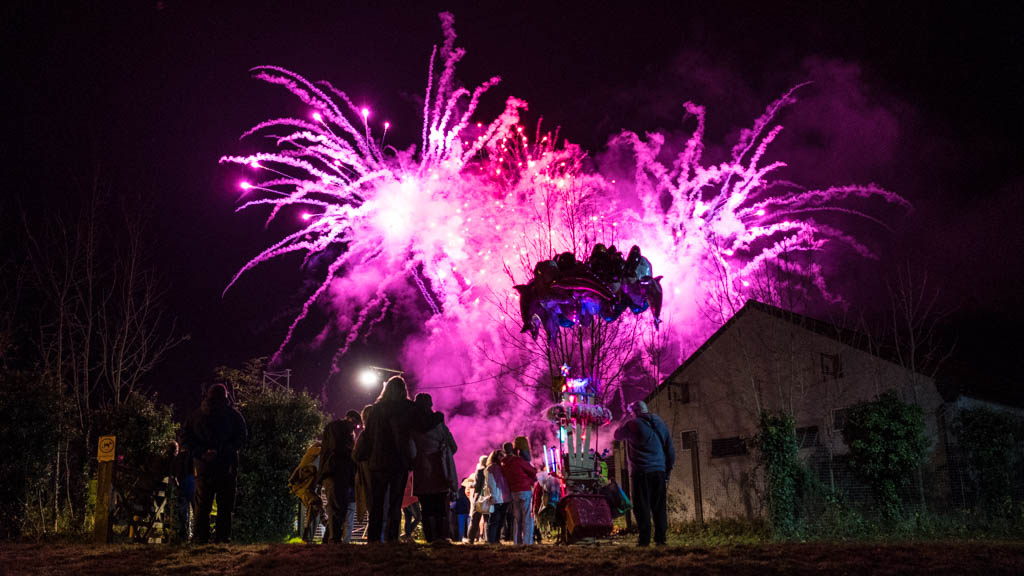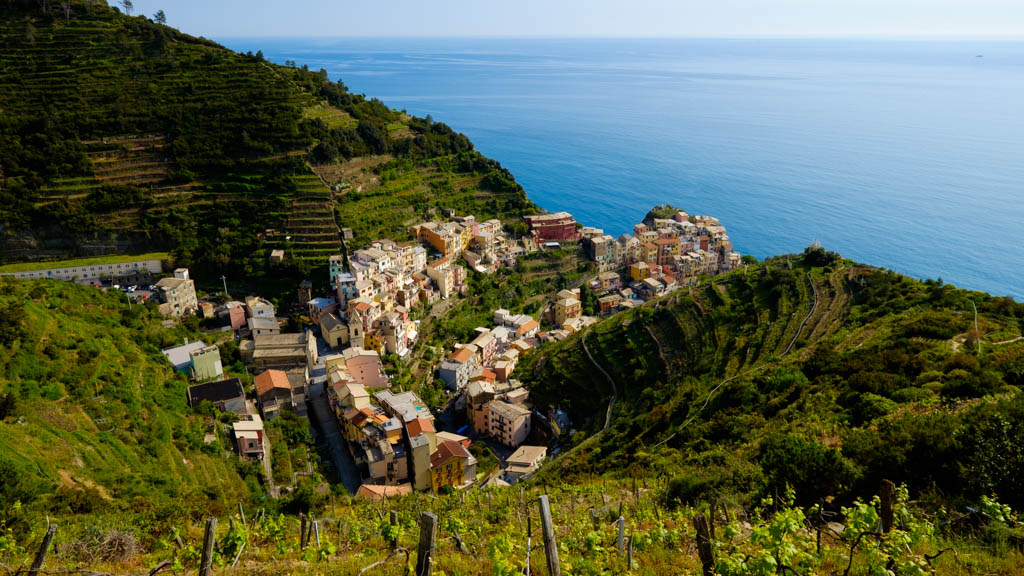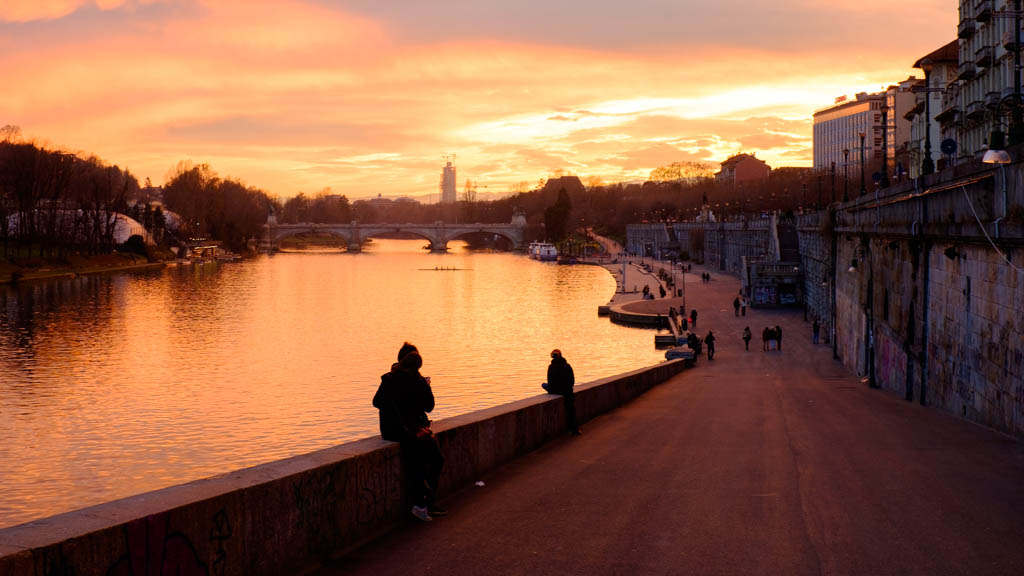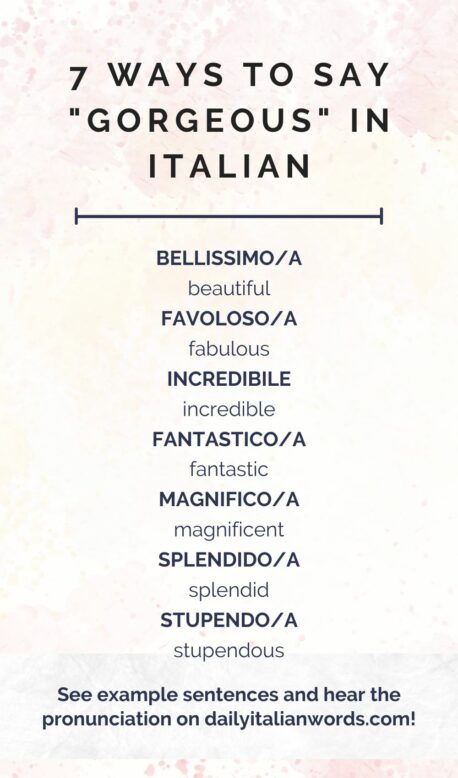Gorgeous is a popular adjective used to describe someone who is beautiful or something that is attractive or pleasant. It can also be used as a term of endearment to flatter someone.
There isn’t a direct translation for gorgeous in Italian, but there are lots of words that express more or less the same thing, and most of them have an English equivalent.
You’ll find all the most popular ones in this article!
Note: I’ve also included extra words at the end of the article that may seem like a valid translation but actually have a different meaning.


BELLISSIMO / A
Bello (masculine) and bella (feminine) mean beautiful. Place -issimo or -issima at the end to add emphasis (very beautiful) and they become valid translations for gorgeous.
Sei bellissima stasera!
You look gorgeous this evening!
If you want to go a step further than bellissima, you can say: sei bella da impazzire which means you’re drop dead gorgeous.
Of course you can use the adjective to describe a location or an object.
Siamo andati a fare una gita in montagna lo scorso weekend. Il posto era bellissimo.
We went for a trip in the mountains this past weekend. The place was gorgeous.
Gorgeous can be an affectionate way of greeting a partner, friend, relative or child. Bellissimo works in the same way.
Ciao bellissima, come stai?
Hello gorgeous, how are you doing?

FAVOLOSO / A
Favoloso (m) and favolosa (f) mean fabulous. Just like English, this word is linked to the word favola (fable, fairy tale) meaning something fantastic or legendary, in addition to describing something extraordinary or spectacular.
Lo spettacolo di ieri sera era favoloso.
The show last night was fabulous.
It is a good substitute for gorgeous as well.
Hai visto l’ultimo film con Cate Blanchett? Lei è favolosa!
Did you watch the latest film with Cate Blanchett? She is gorgeous in it!

INCREDIBILE
As you might have already guessed, incredibile means incredible, indicating something extraordinary that is hard to believe or amazing.
I fuochi erano semplicemente incredibili ieri sera!
The fireworks were simply incredible yesterday.
Incredibile is probably not the first translation that comes to mind for gorgeous, but it can work in situations where the physical beauty of something or the weather is being described.
La luce di quel tramonto era incredibile.
The light of that sunset was gorgeous.
Note that incredibile can also be used to emphasise something negative.
Ha avuto un dolore incredibile per tutta la notte.
He was in an incredible amount of pain the entire night.

FANTASTICO / A
Just like favoloso, fantastico and fantastica (fantastic) can refer to a fantasy world or describe something magnificent.
Questo libro è fantastico! L’ho riletto tre volte.
This book is fantastic! I’ve read it three times.
Il tempo era fantastico ieri: sole tutto il giorno, cielo blu e non una singola nuvola in vista!
The weather was gorgeous yesterday: sunny all day, blue sky and not a single cloud in sight!
You can also use it to express happiness, or to congratulate someone upon hearing their good news.
Abbiamo vinto la gara ieri! – Fantastico! Siete dei grandi!
We won the race yesterday! – Fantastic! You’re great!

MAGNIFICO / A
Magnifico is magnificent in English, another way to describe something with profound admiration.
Torino è una città magnifica.
Turin is a gorgeous / magnificent city.
In the past magnifico was used to describe a very generous person. It could also be a title for an important individual:
- Lorenzo il Magnifico aka Lorenzo the Magnificent was Lorenzo de’ Medici, an important statesman during the Rinascimento (Italian Renaissance)
Today, magnifico can be attributed to a person who has accomplished great feats or heroic endeavours. You may come across it in newspaper or magazine headlines, or in the title of a movie:
- I Magnifici Sette (the Magnificent Seven) is a famous 1960s Western film directed by John Sturges
Magnifico is also a title given to the rector of a university.

SPLENDIDO / A
Splendido means splendid and just like bellissimo, it can be used to describe the beauty of something or someone, while also functioning as a term of endearment.
Sei splendida questa sera!
You look gorgeous tonight!
La voce di Pavarotti è splendida.
Pavarotti’s voice is splendid.
Ciao splendido, tutto a posto?
Hey gorgeous, you all right?

STUPENDO / A
Stupendo means stupendous, wonderful, marvelous and can be used as a replacement for gorgeous. Like splendido and bellissimo, you can use it for people too.
In questa foto hai un sorriso stupendo.
You have a gorgeous smile in this photograph.
Il film che ho visto ieri mi ha davvero colpito. La fotografia era stupenda.
The film I saw yesterday really blew me away. The cinematography was gorgeous.
Other words
If you look for translations of gorgeous online, you may come across the words below:
- Fastoso/a
- Sfarzoso/a
- Sgargiante
- Vistoso/a
Personally I don’t think they represent an accurate translation because in English, gorgeous always has a positive connotation. These Italian words are often used to describe something or someone whose look or attitude is too eye-catching or showy.

Mathieu Gasquet was born and raised in Turin in the north of Italy to an Italian mother and a French father. He provides the audio pronunciation for Daily Italian Words.


